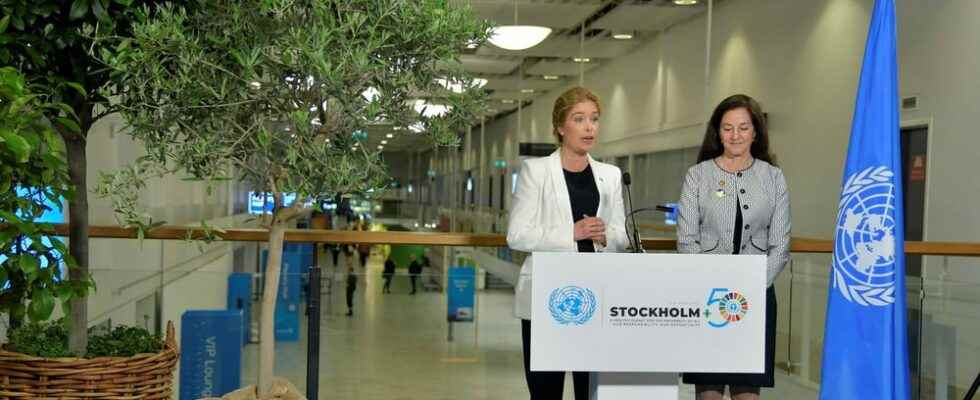The war in Ukraine has a direct impact on the local environment, with emissions from bombed-out industries, destroyed military vehicles and remnants of ammunition. Ecologically sensitive areas are damaged.
Work is already underway to examine and document the impact of the war on the environment.
– The United States participates there, in close cooperation with Ukrainian authorities and other experts, says
Monica Medina, with the somewhat clumsy title of State Secretary for the Sea and international environmental and scientific issues.
The work is about documentation with, among other things, photographs and water samples, and follow-up.
– It may be a small impact on the whole, but it is important that this is followed up, we do it very closely.
Monica Medina is a mystery, but has lived in Washington’s absolute top politics for decades. She has worked for the last three Democratic presidents, Bill Clinton, Barack Obama and Joe Biden, and for the presidential candidates Al Gore and Hillary Clinton. Her husband Ron Klain is chief of staff at the White House and has been in the hub of politics for the same length of time.
She now works closely with John Kerry, the US ambassador for climate change, both with positions at the State Department, the US State Department. Together with her boss, she visited Stockholm during the climate meetings in June.
The war in Ukraine has affected the international climate debate, but has also raised the climate as a security policy issue. Climate change has always really been that way, says Monica Medina, but only in recent years has it been framed as such – largely thanks to a large number of internationally and locally active leaders in the environmental field.
A security issue – and a climate issue – is also food production.
How is the United States affected by the debate on food security in the light of the war?
– The United States is a large country with a huge agricultural sector. We can expect more from uncertainty factors, such as war, drought, fires. We need to think more about how we create a sustainable system – to some extent, of course, we already do. The war has shed light on food, but the issue has been central for a long time.
She continues:
– The impact of the war is short-term, the climate disrupts agriculture in the long term.
She wants to see a more resilient system in the United States and a more regenerative agriculture as methods that do not leach the soils, and she highlights collaborations between industry organizations and universities on desertification.
– I hope that the United States can be a generous country, that we are seen as a world partner.
Like John Kerry, issues of the sea and the Arctic have taken up much of Medina’s time, and the intersection of international politics, law and sustainability, and she addresses surveillance and the possibility of also prosecuting illegal fishing on international waters, as an example of the intersection between international politics, law and sustainability.
Despite the serious situation, Monica Medina says optimistically that she wants to concentrate on the positive, on what is being done. This is despite the fact that emissions continue to increase, not the other way around.
Medina is a lawyer, but has spent most of her career on environmental and climate issues. The way there was through an awakening around air pollution, she says, with a daughter who suffered from severe asthma as a child.
– To see her gasp for breath through a machine… it was awful. But it also made me think about air quality and appreciate things we often take for granted.
But in the polarized United States, legislation is often difficult to pass in Congress. The Biden administration has an ambitious agenda in the climate area, but it also does not reach across party boundaries.
– I think about the hard division every day, says Monica Medina, but instead of criticizing her political opponents, she points to ways forward:
– We have to sew with the threads that are common. Plastic pollution is unpopular all over the world: no one wants to continue throwing disposable plastic bottles, on that issue activists, organizations, the state and the business community agree. Biodiversity is another area where consensus can be found, and where cross-party work is underway. We try to ensure that the changes we make are institutionalized.
By that she means that both the business community and the general public quickly accept and comply with new regulations – it leads to permanence.
But fossil-fuel-dependent, republican-ruled states like Texas and West Virginia are legislating to boycott fossil-energy companies, how do you deal with that?
– Such initiatives represent certain interests. At the federal level, we should listen to everyone. Do not forget that Texas is also at the forefront of renewable energy, with huge investments in solar and wind.
Monica Medina
Born 1962.
Law degree from Columbia law school.
Served in the Army, then with environmental issues in Congress, then at the Department of Justice under the Clinton administration.
Under Barack Obama, she devoted herself to climate and environmental issues, to the Arctic, including as a member of The Whaling commission.
She has led the work on gender equality and discrimination against women in the military.
In recent years, she has run the platform Our daily planet, and as a teacher at Georgetown University.
She was approved as Minister in September 2021.
Lives just outside Washington DC, married, three children.
Runs every day:
“As far as I can, between 4.5 and 8 kilometers. How beautiful it is to run in Stockholm! Next time I will swim too. ”
Show more
